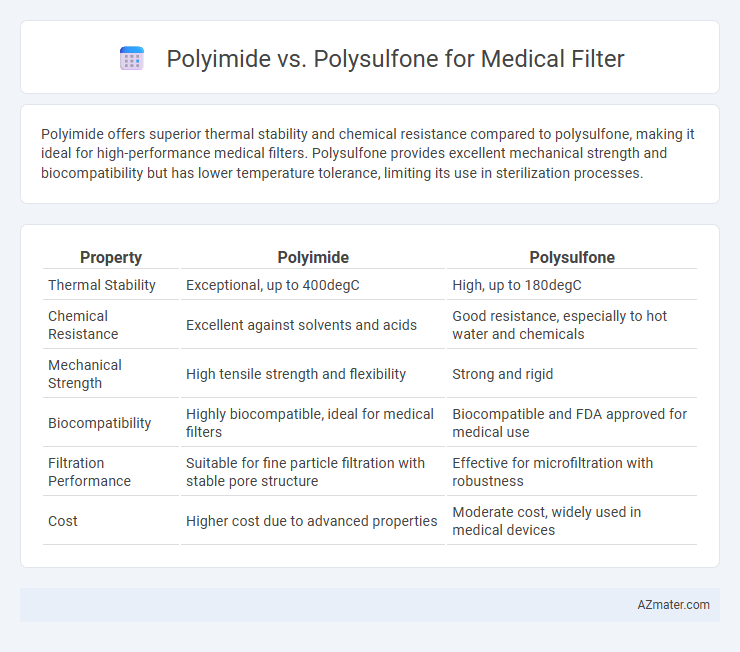Polyimide offers superior thermal stability and chemical resistance compared to polysulfone, making it ideal for high-performance medical filters. Polysulfone provides excellent mechanical strength and biocompatibility but has lower temperature tolerance, limiting its use in sterilization processes.
Table of Comparison
| Property | Polyimide | Polysulfone |
|---|---|---|
| Thermal Stability | Exceptional, up to 400degC | High, up to 180degC |
| Chemical Resistance | Excellent against solvents and acids | Good resistance, especially to hot water and chemicals |
| Mechanical Strength | High tensile strength and flexibility | Strong and rigid |
| Biocompatibility | Highly biocompatible, ideal for medical filters | Biocompatible and FDA approved for medical use |
| Filtration Performance | Suitable for fine particle filtration with stable pore structure | Effective for microfiltration with robustness |
| Cost | Higher cost due to advanced properties | Moderate cost, widely used in medical devices |
Introduction to Medical Filter Materials
Polyimide and polysulfone are advanced polymers widely utilized in medical filter applications due to their exceptional thermal stability and chemical resistance. Polyimide offers superior flexibility and high-temperature tolerance, making it ideal for sterilization processes in medical environments. Polysulfone provides excellent mechanical strength and biocompatibility, ensuring reliable filtration performance in critical healthcare devices.
Overview of Polyimide and Polysulfone
Polyimide offers exceptional thermal stability and chemical resistance, making it ideal for high-performance medical filters requiring durability under sterilization processes. Polysulfone provides excellent mechanical strength and hydrolytic stability, ensuring reliable filtration in aqueous medical applications. Both polymers exhibit biocompatibility, but polyimide's higher temperature tolerance suits more demanding medical filtration environments.
Biocompatibility Comparison
Polyimide and polysulfone are both widely used materials in medical filters due to their excellent mechanical properties and chemical resistance, but their biocompatibility profiles differ significantly. Polyimide exhibits superior biocompatibility with minimal cytotoxicity and excellent long-term stability in physiological environments, making it suitable for implantable filter applications. Polysulfone also offers good biocompatibility and is widely accepted in blood filtration and dialysis membranes, but it may exhibit slightly higher protein adsorption and cellular interaction compared to polyimide, impacting its performance in sensitive medical devices.
Chemical Resistance: Polyimide vs Polysulfone
Polyimide exhibits superior chemical resistance to aggressive solvents, acids, and bases compared to polysulfone, making it ideal for sterilization processes involving harsh chemicals in medical filters. Polysulfone offers good resistance to oxidation and hydrolysis but is less stable against strong acids and organic solvents. This chemical durability of polyimide enhances the longevity and reliability of medical filters exposed to diverse chemical environments.
Thermal Stability and Sterilization
Polyimide exhibits superior thermal stability withstanding temperatures up to 400degC, making it ideal for high-temperature sterilization methods such as autoclaving and gamma irradiation. Polysulfone offers good thermal stability up to approximately 180degC, suitable for steam sterilization but less effective for high-temperature or prolonged sterilization cycles. The enhanced thermal resistance of polyimide ensures durability and performance retention in demanding medical filter applications requiring rigorous sterilization protocols.
Mechanical Strength and Durability
Polyimide exhibits superior mechanical strength and thermal stability, making it highly durable for demanding medical filter applications where resistance to mechanical stress and high temperatures is critical. Polysulfone offers excellent toughness and chemical resistance but generally has lower tensile strength compared to polyimide, which can impact long-term durability under rigorous operational conditions. The choice between polyimide and polysulfone hinges on the specific requirements for mechanical endurance and environmental durability in medical filtration systems.
Filtration Performance Metrics
Polyimide demonstrates superior filtration performance metrics in medical filters due to its exceptional thermal stability, chemical resistance, and fine pore size control, enabling efficient capture of submicron particles and biological contaminants. Polysulfone, while offering good chemical resistance and mechanical strength, generally exhibits lower filtration efficiency and pore size precision compared to polyimide, potentially limiting its effectiveness in critical sterilization and pathogen removal. In applications demanding high filtration accuracy and durability under sterilization conditions, polyimide filters outperform polysulfone by maintaining consistent flow rates and filtration selectivity over extended use.
Regulatory Approvals and Certifications
Polyimide and polysulfone are widely used materials in medical filters, with polysulfone often preferred due to its extensive regulatory approvals such as FDA and ISO 10993 for biocompatibility and sterilization compatibility. Polyimide, known for high thermal stability and chemical resistance, has fewer specific medical regulatory certifications but is gaining traction as testing and approvals improve. Polysulfone's long-standing acceptance and certification streamline compliance in medical device manufacturing, making it a regulatory-favored choice for critical filtration applications.
Cost and Manufacturing Considerations
Polyimide offers superior thermal stability and chemical resistance, but its higher material cost and complex processing can increase manufacturing expenses for medical filters. Polysulfone provides a more cost-effective alternative with easier fabrication and good mechanical properties, making it suitable for large-scale production. Balancing cost and manufacturing efficiency, polysulfone is often preferred when budget constraints are critical, whereas polyimide is selected for demanding sterilization and performance requirements.
Choosing the Right Polymer for Medical Filters
Polyimide offers exceptional thermal stability and chemical resistance, making it ideal for medical filters that require sterilization and exposure to harsh chemicals. Polysulfone provides excellent mechanical strength and hydrolytic stability, ensuring durability in aqueous environments common in medical applications. Choosing the right polymer depends on the specific filtration requirements, such as temperature tolerance, chemical exposure, and biocompatibility standards critical in medical device manufacturing.

Infographic: Polyimide vs Polysulfone for Medical Filter
 azmater.com
azmater.com